Influencing Stakeholders ( Distinction Criteria )
VerifiedAdded on 2023/06/10
|8
|2069
|68
AI Summary
This essay covers the importance of several stakeholders for organisations and their effectiveness in relationship management. It highlights relationship management strategies which leads to direct effective improvement in working environment. It assess the ways in which relationship management strategies will improve manager's ability to enhance working relationships.
Contribute Materials
Your contribution can guide someone’s learning journey. Share your
documents today.
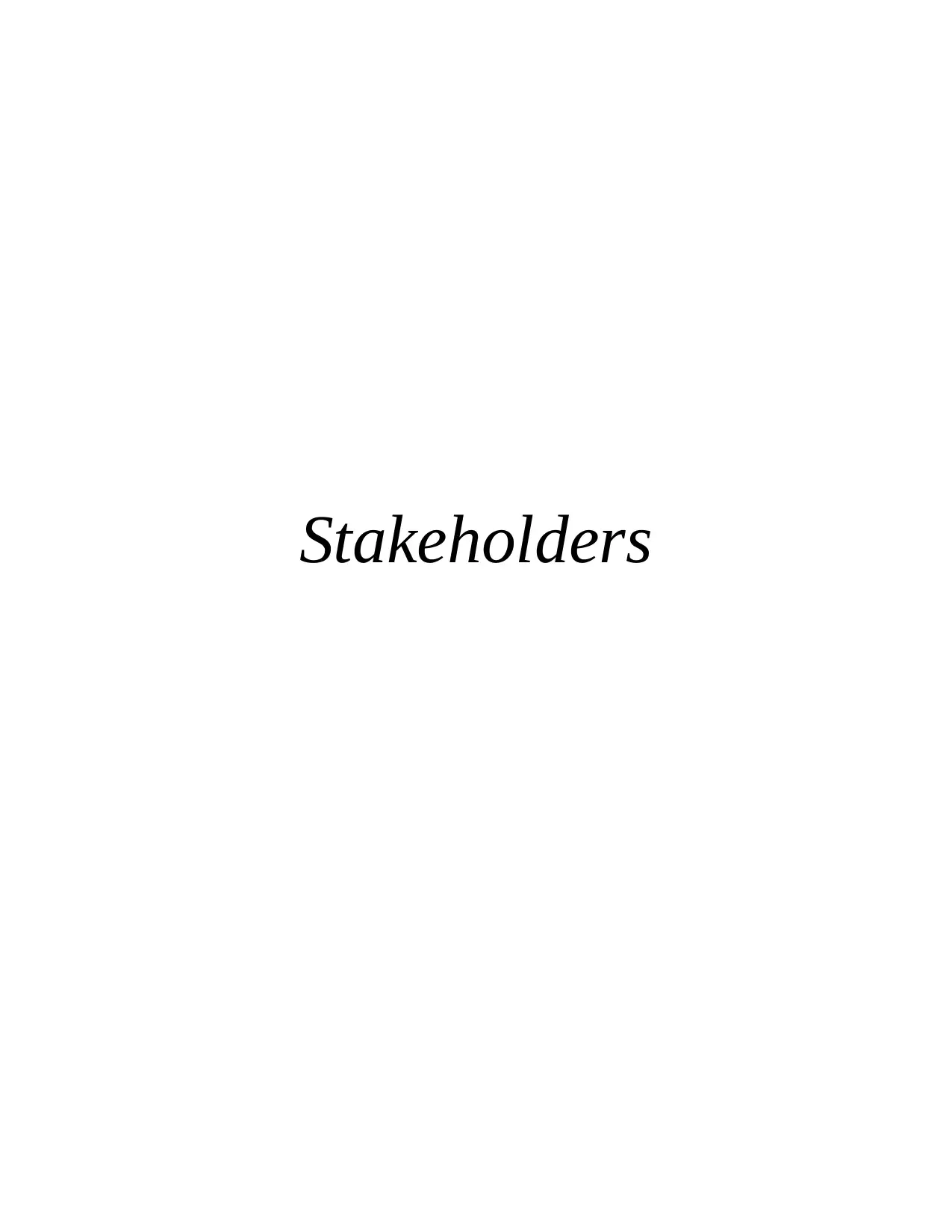
Stakeholders
Secure Best Marks with AI Grader
Need help grading? Try our AI Grader for instant feedback on your assignments.
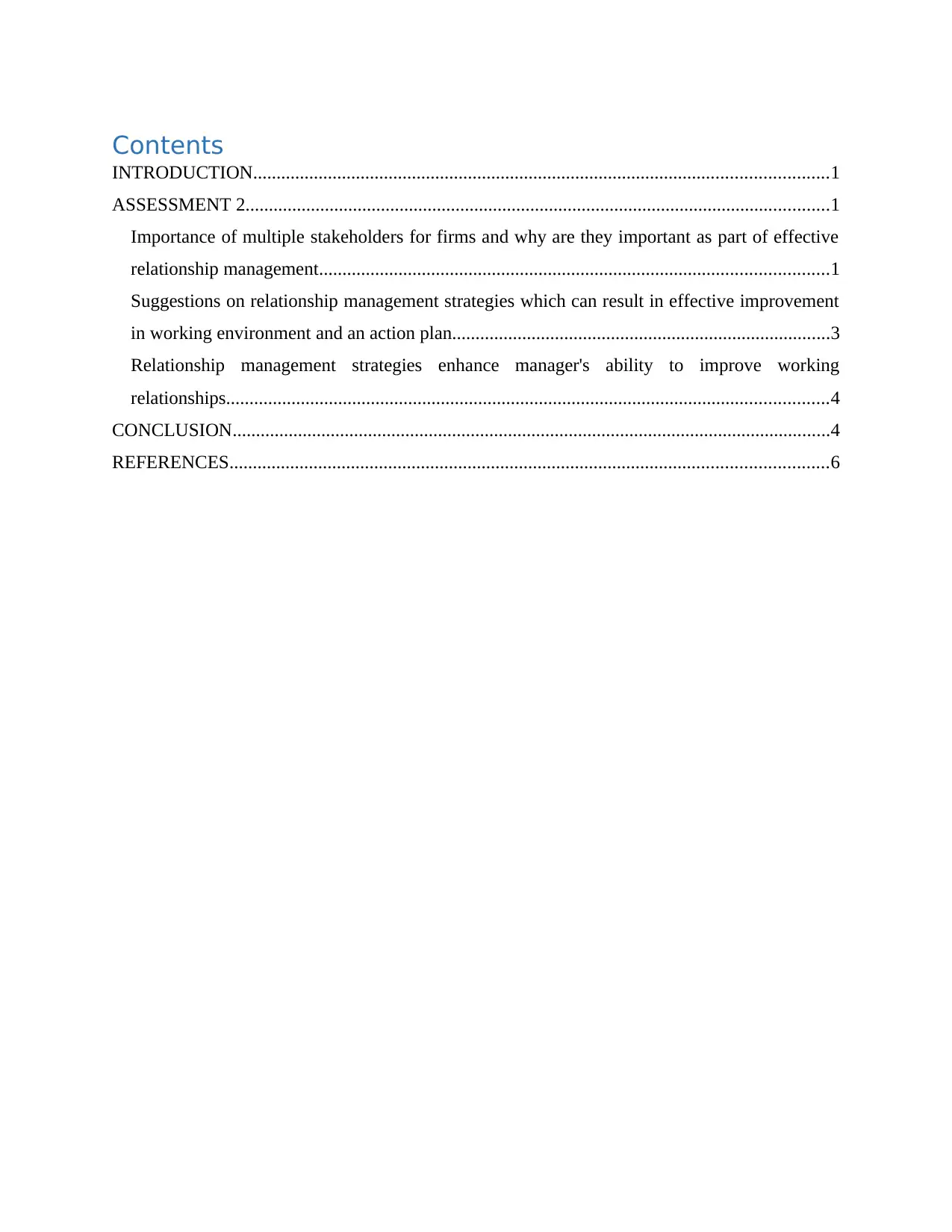
Contents
INTRODUCTION...........................................................................................................................1
ASSESSMENT 2.............................................................................................................................1
Importance of multiple stakeholders for firms and why are they important as part of effective
relationship management.............................................................................................................1
Suggestions on relationship management strategies which can result in effective improvement
in working environment and an action plan.................................................................................3
Relationship management strategies enhance manager's ability to improve working
relationships.................................................................................................................................4
CONCLUSION................................................................................................................................4
REFERENCES................................................................................................................................6
INTRODUCTION...........................................................................................................................1
ASSESSMENT 2.............................................................................................................................1
Importance of multiple stakeholders for firms and why are they important as part of effective
relationship management.............................................................................................................1
Suggestions on relationship management strategies which can result in effective improvement
in working environment and an action plan.................................................................................3
Relationship management strategies enhance manager's ability to improve working
relationships.................................................................................................................................4
CONCLUSION................................................................................................................................4
REFERENCES................................................................................................................................6

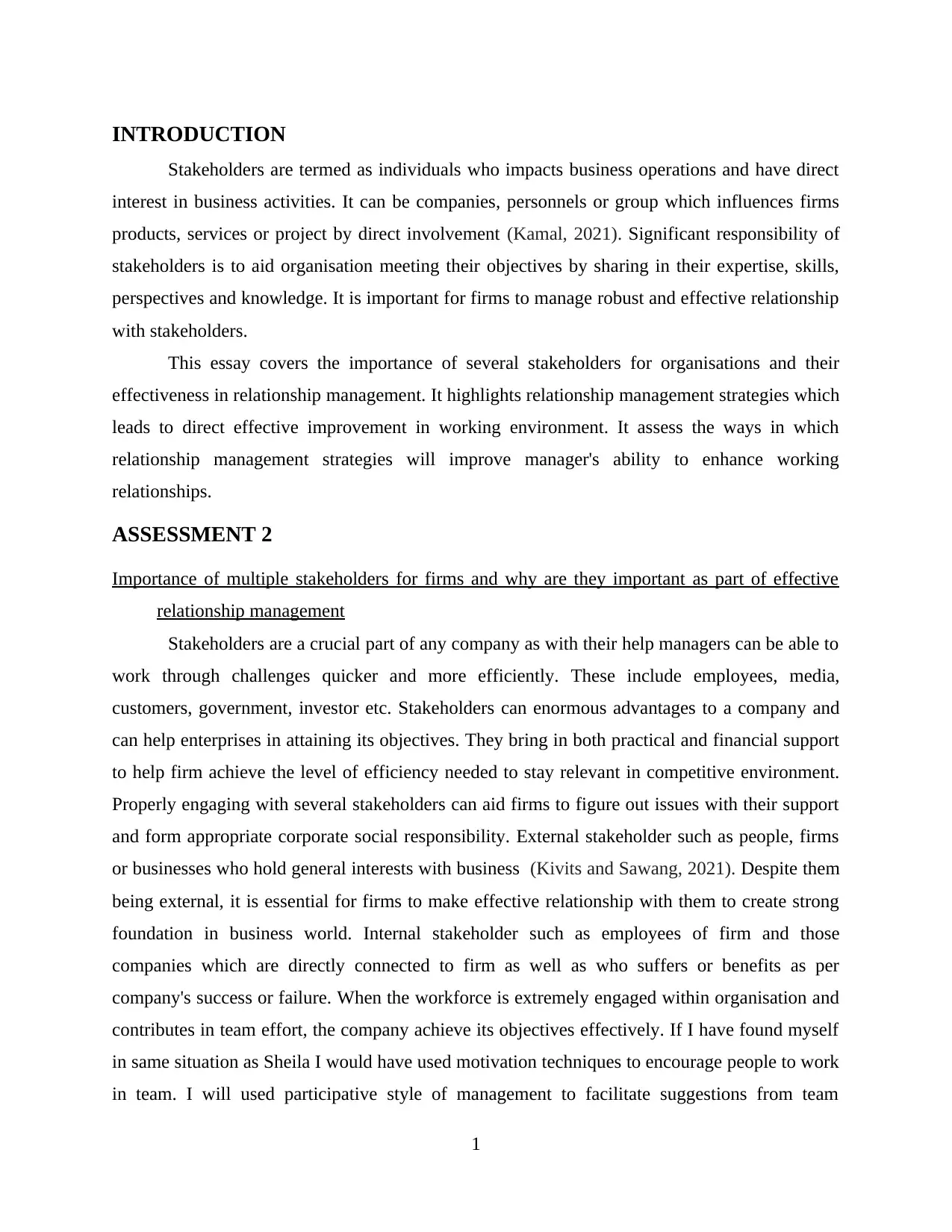
INTRODUCTION
Stakeholders are termed as individuals who impacts business operations and have direct
interest in business activities. It can be companies, personnels or group which influences firms
products, services or project by direct involvement (Kamal, 2021). Significant responsibility of
stakeholders is to aid organisation meeting their objectives by sharing in their expertise, skills,
perspectives and knowledge. It is important for firms to manage robust and effective relationship
with stakeholders.
This essay covers the importance of several stakeholders for organisations and their
effectiveness in relationship management. It highlights relationship management strategies which
leads to direct effective improvement in working environment. It assess the ways in which
relationship management strategies will improve manager's ability to enhance working
relationships.
ASSESSMENT 2
Importance of multiple stakeholders for firms and why are they important as part of effective
relationship management
Stakeholders are a crucial part of any company as with their help managers can be able to
work through challenges quicker and more efficiently. These include employees, media,
customers, government, investor etc. Stakeholders can enormous advantages to a company and
can help enterprises in attaining its objectives. They bring in both practical and financial support
to help firm achieve the level of efficiency needed to stay relevant in competitive environment.
Properly engaging with several stakeholders can aid firms to figure out issues with their support
and form appropriate corporate social responsibility. External stakeholder such as people, firms
or businesses who hold general interests with business (Kivits and Sawang, 2021). Despite them
being external, it is essential for firms to make effective relationship with them to create strong
foundation in business world. Internal stakeholder such as employees of firm and those
companies which are directly connected to firm as well as who suffers or benefits as per
company's success or failure. When the workforce is extremely engaged within organisation and
contributes in team effort, the company achieve its objectives effectively. If I have found myself
in same situation as Sheila I would have used motivation techniques to encourage people to work
in team. I will used participative style of management to facilitate suggestions from team
1
Stakeholders are termed as individuals who impacts business operations and have direct
interest in business activities. It can be companies, personnels or group which influences firms
products, services or project by direct involvement (Kamal, 2021). Significant responsibility of
stakeholders is to aid organisation meeting their objectives by sharing in their expertise, skills,
perspectives and knowledge. It is important for firms to manage robust and effective relationship
with stakeholders.
This essay covers the importance of several stakeholders for organisations and their
effectiveness in relationship management. It highlights relationship management strategies which
leads to direct effective improvement in working environment. It assess the ways in which
relationship management strategies will improve manager's ability to enhance working
relationships.
ASSESSMENT 2
Importance of multiple stakeholders for firms and why are they important as part of effective
relationship management
Stakeholders are a crucial part of any company as with their help managers can be able to
work through challenges quicker and more efficiently. These include employees, media,
customers, government, investor etc. Stakeholders can enormous advantages to a company and
can help enterprises in attaining its objectives. They bring in both practical and financial support
to help firm achieve the level of efficiency needed to stay relevant in competitive environment.
Properly engaging with several stakeholders can aid firms to figure out issues with their support
and form appropriate corporate social responsibility. External stakeholder such as people, firms
or businesses who hold general interests with business (Kivits and Sawang, 2021). Despite them
being external, it is essential for firms to make effective relationship with them to create strong
foundation in business world. Internal stakeholder such as employees of firm and those
companies which are directly connected to firm as well as who suffers or benefits as per
company's success or failure. When the workforce is extremely engaged within organisation and
contributes in team effort, the company achieve its objectives effectively. If I have found myself
in same situation as Sheila I would have used motivation techniques to encourage people to work
in team. I will used participative style of management to facilitate suggestions from team
1
Secure Best Marks with AI Grader
Need help grading? Try our AI Grader for instant feedback on your assignments.
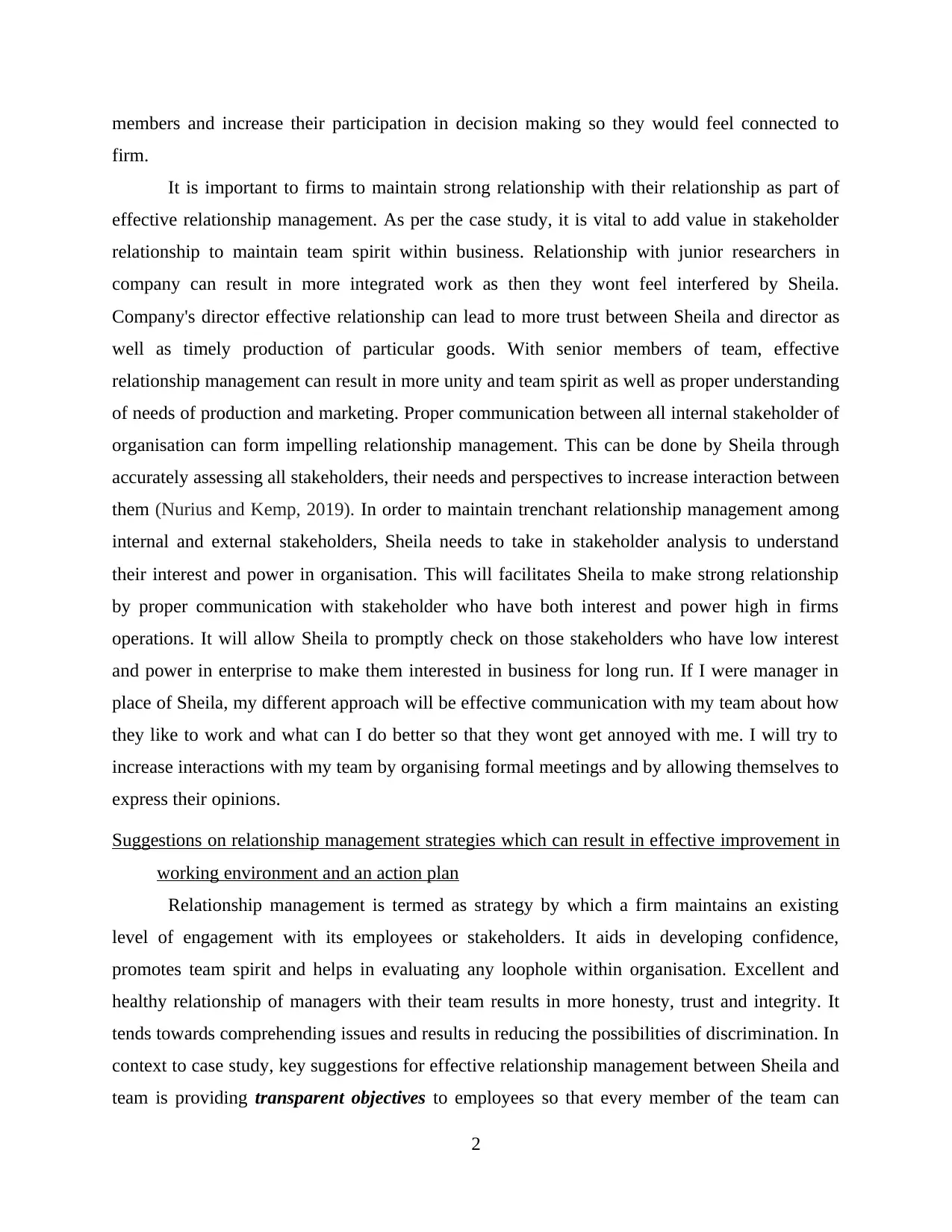
members and increase their participation in decision making so they would feel connected to
firm.
It is important to firms to maintain strong relationship with their relationship as part of
effective relationship management. As per the case study, it is vital to add value in stakeholder
relationship to maintain team spirit within business. Relationship with junior researchers in
company can result in more integrated work as then they wont feel interfered by Sheila.
Company's director effective relationship can lead to more trust between Sheila and director as
well as timely production of particular goods. With senior members of team, effective
relationship management can result in more unity and team spirit as well as proper understanding
of needs of production and marketing. Proper communication between all internal stakeholder of
organisation can form impelling relationship management. This can be done by Sheila through
accurately assessing all stakeholders, their needs and perspectives to increase interaction between
them (Nurius and Kemp, 2019). In order to maintain trenchant relationship management among
internal and external stakeholders, Sheila needs to take in stakeholder analysis to understand
their interest and power in organisation. This will facilitates Sheila to make strong relationship
by proper communication with stakeholder who have both interest and power high in firms
operations. It will allow Sheila to promptly check on those stakeholders who have low interest
and power in enterprise to make them interested in business for long run. If I were manager in
place of Sheila, my different approach will be effective communication with my team about how
they like to work and what can I do better so that they wont get annoyed with me. I will try to
increase interactions with my team by organising formal meetings and by allowing themselves to
express their opinions.
Suggestions on relationship management strategies which can result in effective improvement in
working environment and an action plan
Relationship management is termed as strategy by which a firm maintains an existing
level of engagement with its employees or stakeholders. It aids in developing confidence,
promotes team spirit and helps in evaluating any loophole within organisation. Excellent and
healthy relationship of managers with their team results in more honesty, trust and integrity. It
tends towards comprehending issues and results in reducing the possibilities of discrimination. In
context to case study, key suggestions for effective relationship management between Sheila and
team is providing transparent objectives to employees so that every member of the team can
2
firm.
It is important to firms to maintain strong relationship with their relationship as part of
effective relationship management. As per the case study, it is vital to add value in stakeholder
relationship to maintain team spirit within business. Relationship with junior researchers in
company can result in more integrated work as then they wont feel interfered by Sheila.
Company's director effective relationship can lead to more trust between Sheila and director as
well as timely production of particular goods. With senior members of team, effective
relationship management can result in more unity and team spirit as well as proper understanding
of needs of production and marketing. Proper communication between all internal stakeholder of
organisation can form impelling relationship management. This can be done by Sheila through
accurately assessing all stakeholders, their needs and perspectives to increase interaction between
them (Nurius and Kemp, 2019). In order to maintain trenchant relationship management among
internal and external stakeholders, Sheila needs to take in stakeholder analysis to understand
their interest and power in organisation. This will facilitates Sheila to make strong relationship
by proper communication with stakeholder who have both interest and power high in firms
operations. It will allow Sheila to promptly check on those stakeholders who have low interest
and power in enterprise to make them interested in business for long run. If I were manager in
place of Sheila, my different approach will be effective communication with my team about how
they like to work and what can I do better so that they wont get annoyed with me. I will try to
increase interactions with my team by organising formal meetings and by allowing themselves to
express their opinions.
Suggestions on relationship management strategies which can result in effective improvement in
working environment and an action plan
Relationship management is termed as strategy by which a firm maintains an existing
level of engagement with its employees or stakeholders. It aids in developing confidence,
promotes team spirit and helps in evaluating any loophole within organisation. Excellent and
healthy relationship of managers with their team results in more honesty, trust and integrity. It
tends towards comprehending issues and results in reducing the possibilities of discrimination. In
context to case study, key suggestions for effective relationship management between Sheila and
team is providing transparent objectives to employees so that every member of the team can
2
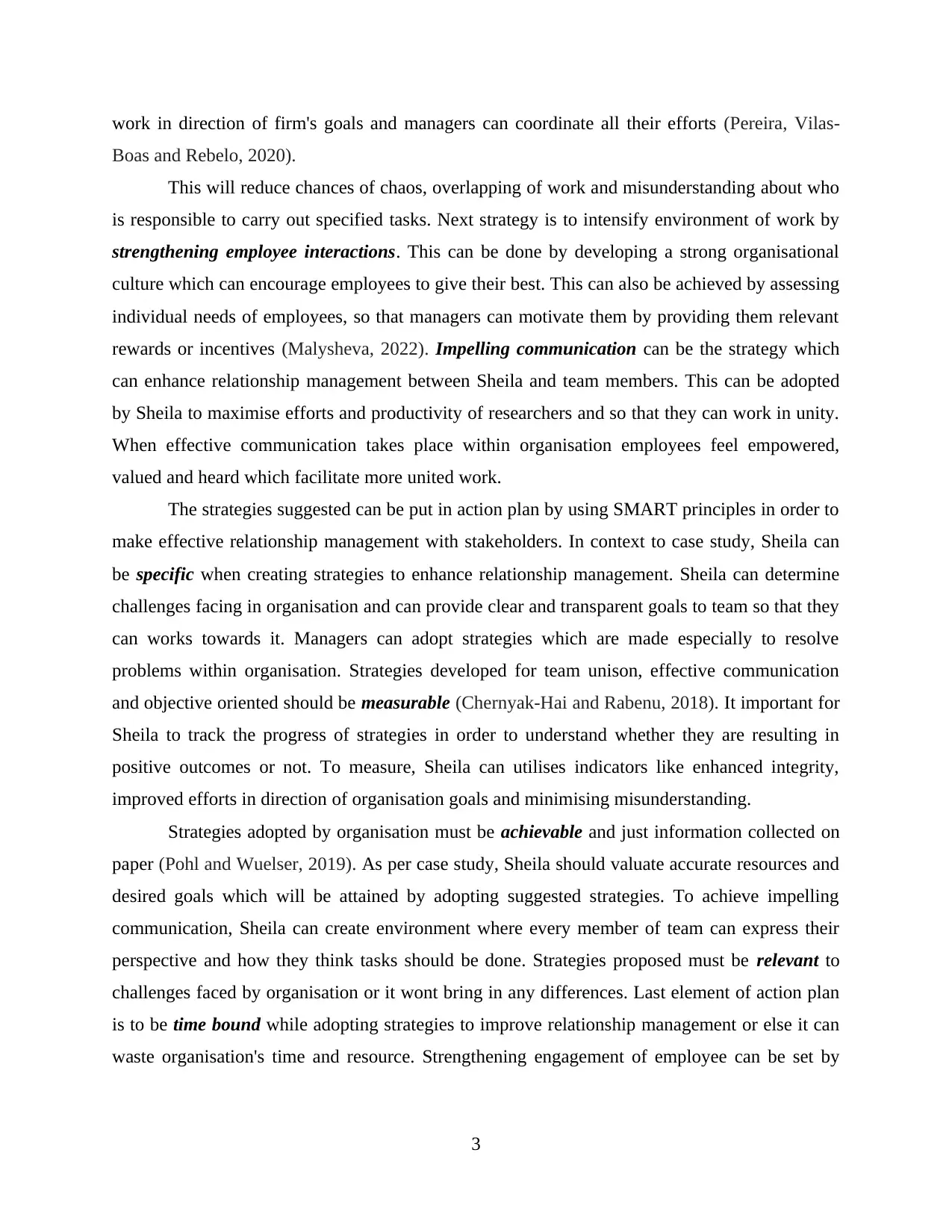
work in direction of firm's goals and managers can coordinate all their efforts (Pereira, Vilas-
Boas and Rebelo, 2020).
This will reduce chances of chaos, overlapping of work and misunderstanding about who
is responsible to carry out specified tasks. Next strategy is to intensify environment of work by
strengthening employee interactions. This can be done by developing a strong organisational
culture which can encourage employees to give their best. This can also be achieved by assessing
individual needs of employees, so that managers can motivate them by providing them relevant
rewards or incentives (Malysheva, 2022). Impelling communication can be the strategy which
can enhance relationship management between Sheila and team members. This can be adopted
by Sheila to maximise efforts and productivity of researchers and so that they can work in unity.
When effective communication takes place within organisation employees feel empowered,
valued and heard which facilitate more united work.
The strategies suggested can be put in action plan by using SMART principles in order to
make effective relationship management with stakeholders. In context to case study, Sheila can
be specific when creating strategies to enhance relationship management. Sheila can determine
challenges facing in organisation and can provide clear and transparent goals to team so that they
can works towards it. Managers can adopt strategies which are made especially to resolve
problems within organisation. Strategies developed for team unison, effective communication
and objective oriented should be measurable (Chernyak-Hai and Rabenu, 2018). It important for
Sheila to track the progress of strategies in order to understand whether they are resulting in
positive outcomes or not. To measure, Sheila can utilises indicators like enhanced integrity,
improved efforts in direction of organisation goals and minimising misunderstanding.
Strategies adopted by organisation must be achievable and just information collected on
paper (Pohl and Wuelser, 2019). As per case study, Sheila should valuate accurate resources and
desired goals which will be attained by adopting suggested strategies. To achieve impelling
communication, Sheila can create environment where every member of team can express their
perspective and how they think tasks should be done. Strategies proposed must be relevant to
challenges faced by organisation or it wont bring in any differences. Last element of action plan
is to be time bound while adopting strategies to improve relationship management or else it can
waste organisation's time and resource. Strengthening engagement of employee can be set by
3
Boas and Rebelo, 2020).
This will reduce chances of chaos, overlapping of work and misunderstanding about who
is responsible to carry out specified tasks. Next strategy is to intensify environment of work by
strengthening employee interactions. This can be done by developing a strong organisational
culture which can encourage employees to give their best. This can also be achieved by assessing
individual needs of employees, so that managers can motivate them by providing them relevant
rewards or incentives (Malysheva, 2022). Impelling communication can be the strategy which
can enhance relationship management between Sheila and team members. This can be adopted
by Sheila to maximise efforts and productivity of researchers and so that they can work in unity.
When effective communication takes place within organisation employees feel empowered,
valued and heard which facilitate more united work.
The strategies suggested can be put in action plan by using SMART principles in order to
make effective relationship management with stakeholders. In context to case study, Sheila can
be specific when creating strategies to enhance relationship management. Sheila can determine
challenges facing in organisation and can provide clear and transparent goals to team so that they
can works towards it. Managers can adopt strategies which are made especially to resolve
problems within organisation. Strategies developed for team unison, effective communication
and objective oriented should be measurable (Chernyak-Hai and Rabenu, 2018). It important for
Sheila to track the progress of strategies in order to understand whether they are resulting in
positive outcomes or not. To measure, Sheila can utilises indicators like enhanced integrity,
improved efforts in direction of organisation goals and minimising misunderstanding.
Strategies adopted by organisation must be achievable and just information collected on
paper (Pohl and Wuelser, 2019). As per case study, Sheila should valuate accurate resources and
desired goals which will be attained by adopting suggested strategies. To achieve impelling
communication, Sheila can create environment where every member of team can express their
perspective and how they think tasks should be done. Strategies proposed must be relevant to
challenges faced by organisation or it wont bring in any differences. Last element of action plan
is to be time bound while adopting strategies to improve relationship management or else it can
waste organisation's time and resource. Strengthening engagement of employee can be set by
3
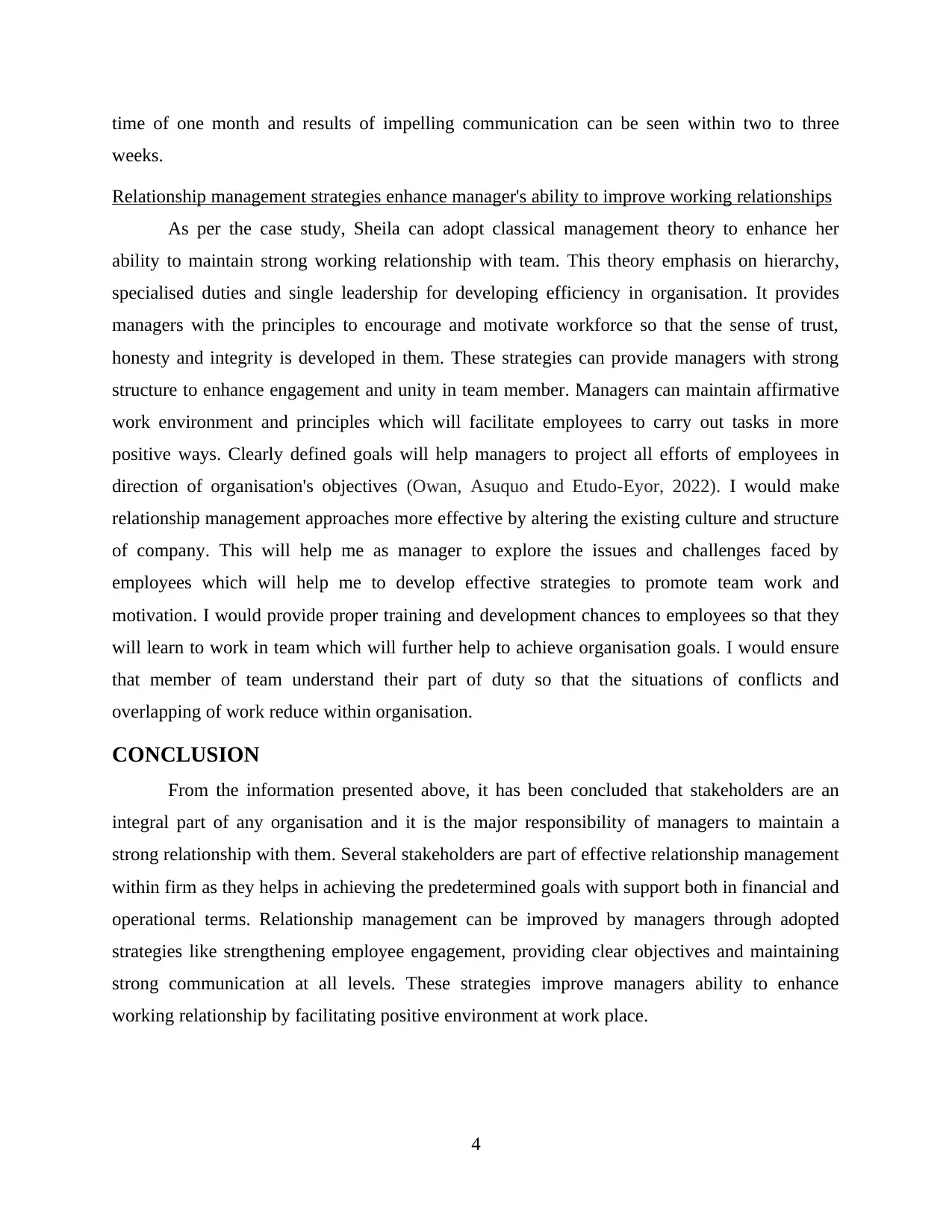
time of one month and results of impelling communication can be seen within two to three
weeks.
Relationship management strategies enhance manager's ability to improve working relationships
As per the case study, Sheila can adopt classical management theory to enhance her
ability to maintain strong working relationship with team. This theory emphasis on hierarchy,
specialised duties and single leadership for developing efficiency in organisation. It provides
managers with the principles to encourage and motivate workforce so that the sense of trust,
honesty and integrity is developed in them. These strategies can provide managers with strong
structure to enhance engagement and unity in team member. Managers can maintain affirmative
work environment and principles which will facilitate employees to carry out tasks in more
positive ways. Clearly defined goals will help managers to project all efforts of employees in
direction of organisation's objectives (Owan, Asuquo and Etudo-Eyor, 2022). I would make
relationship management approaches more effective by altering the existing culture and structure
of company. This will help me as manager to explore the issues and challenges faced by
employees which will help me to develop effective strategies to promote team work and
motivation. I would provide proper training and development chances to employees so that they
will learn to work in team which will further help to achieve organisation goals. I would ensure
that member of team understand their part of duty so that the situations of conflicts and
overlapping of work reduce within organisation.
CONCLUSION
From the information presented above, it has been concluded that stakeholders are an
integral part of any organisation and it is the major responsibility of managers to maintain a
strong relationship with them. Several stakeholders are part of effective relationship management
within firm as they helps in achieving the predetermined goals with support both in financial and
operational terms. Relationship management can be improved by managers through adopted
strategies like strengthening employee engagement, providing clear objectives and maintaining
strong communication at all levels. These strategies improve managers ability to enhance
working relationship by facilitating positive environment at work place.
4
weeks.
Relationship management strategies enhance manager's ability to improve working relationships
As per the case study, Sheila can adopt classical management theory to enhance her
ability to maintain strong working relationship with team. This theory emphasis on hierarchy,
specialised duties and single leadership for developing efficiency in organisation. It provides
managers with the principles to encourage and motivate workforce so that the sense of trust,
honesty and integrity is developed in them. These strategies can provide managers with strong
structure to enhance engagement and unity in team member. Managers can maintain affirmative
work environment and principles which will facilitate employees to carry out tasks in more
positive ways. Clearly defined goals will help managers to project all efforts of employees in
direction of organisation's objectives (Owan, Asuquo and Etudo-Eyor, 2022). I would make
relationship management approaches more effective by altering the existing culture and structure
of company. This will help me as manager to explore the issues and challenges faced by
employees which will help me to develop effective strategies to promote team work and
motivation. I would provide proper training and development chances to employees so that they
will learn to work in team which will further help to achieve organisation goals. I would ensure
that member of team understand their part of duty so that the situations of conflicts and
overlapping of work reduce within organisation.
CONCLUSION
From the information presented above, it has been concluded that stakeholders are an
integral part of any organisation and it is the major responsibility of managers to maintain a
strong relationship with them. Several stakeholders are part of effective relationship management
within firm as they helps in achieving the predetermined goals with support both in financial and
operational terms. Relationship management can be improved by managers through adopted
strategies like strengthening employee engagement, providing clear objectives and maintaining
strong communication at all levels. These strategies improve managers ability to enhance
working relationship by facilitating positive environment at work place.
4
Paraphrase This Document
Need a fresh take? Get an instant paraphrase of this document with our AI Paraphraser
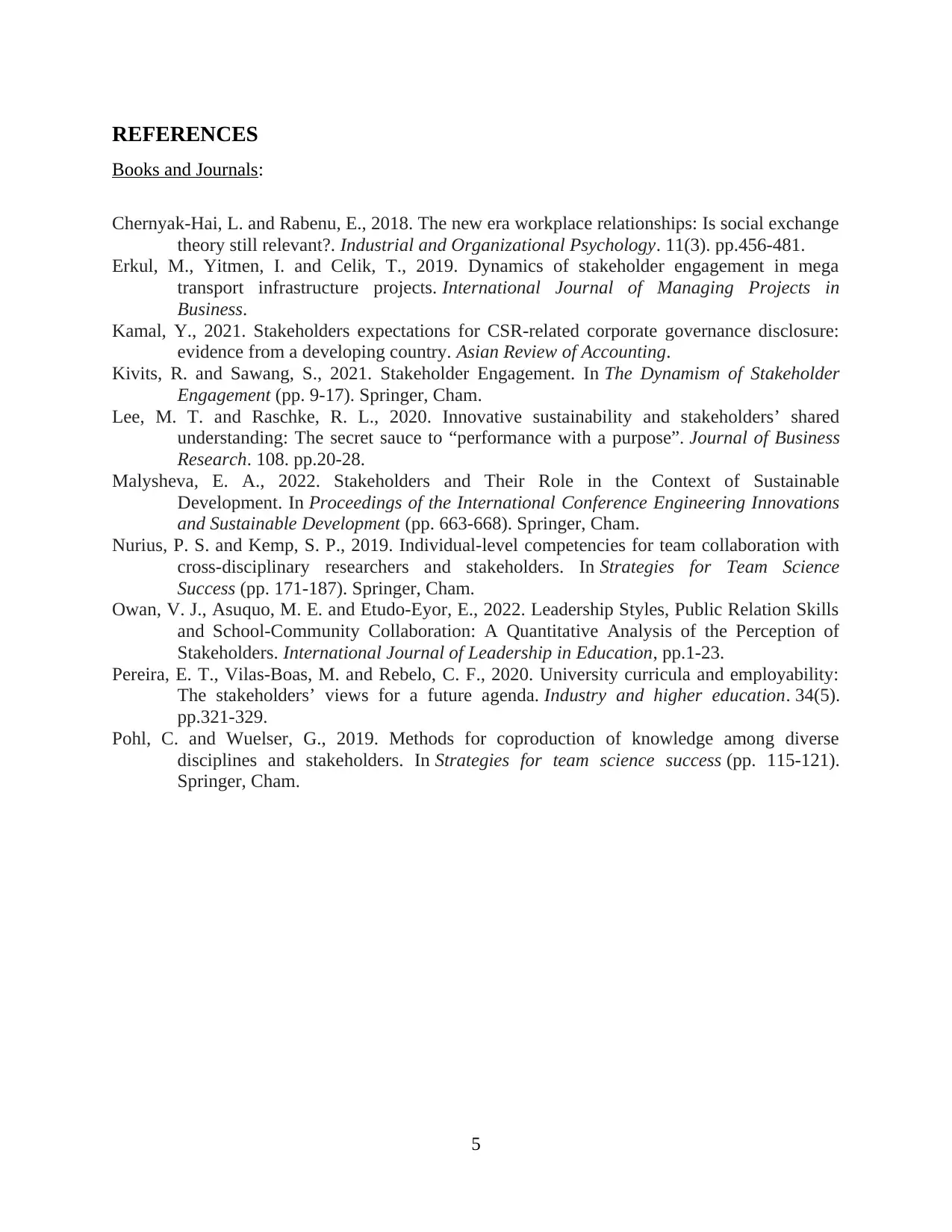
REFERENCES
Books and Journals:
Chernyak-Hai, L. and Rabenu, E., 2018. The new era workplace relationships: Is social exchange
theory still relevant?. Industrial and Organizational Psychology. 11(3). pp.456-481.
Erkul, M., Yitmen, I. and Celik, T., 2019. Dynamics of stakeholder engagement in mega
transport infrastructure projects. International Journal of Managing Projects in
Business.
Kamal, Y., 2021. Stakeholders expectations for CSR-related corporate governance disclosure:
evidence from a developing country. Asian Review of Accounting.
Kivits, R. and Sawang, S., 2021. Stakeholder Engagement. In The Dynamism of Stakeholder
Engagement (pp. 9-17). Springer, Cham.
Lee, M. T. and Raschke, R. L., 2020. Innovative sustainability and stakeholders’ shared
understanding: The secret sauce to “performance with a purpose”. Journal of Business
Research. 108. pp.20-28.
Malysheva, E. A., 2022. Stakeholders and Their Role in the Context of Sustainable
Development. In Proceedings of the International Conference Engineering Innovations
and Sustainable Development (pp. 663-668). Springer, Cham.
Nurius, P. S. and Kemp, S. P., 2019. Individual-level competencies for team collaboration with
cross-disciplinary researchers and stakeholders. In Strategies for Team Science
Success (pp. 171-187). Springer, Cham.
Owan, V. J., Asuquo, M. E. and Etudo-Eyor, E., 2022. Leadership Styles, Public Relation Skills
and School-Community Collaboration: A Quantitative Analysis of the Perception of
Stakeholders. International Journal of Leadership in Education, pp.1-23.
Pereira, E. T., Vilas-Boas, M. and Rebelo, C. F., 2020. University curricula and employability:
The stakeholders’ views for a future agenda. Industry and higher education. 34(5).
pp.321-329.
Pohl, C. and Wuelser, G., 2019. Methods for coproduction of knowledge among diverse
disciplines and stakeholders. In Strategies for team science success (pp. 115-121).
Springer, Cham.
5
Books and Journals:
Chernyak-Hai, L. and Rabenu, E., 2018. The new era workplace relationships: Is social exchange
theory still relevant?. Industrial and Organizational Psychology. 11(3). pp.456-481.
Erkul, M., Yitmen, I. and Celik, T., 2019. Dynamics of stakeholder engagement in mega
transport infrastructure projects. International Journal of Managing Projects in
Business.
Kamal, Y., 2021. Stakeholders expectations for CSR-related corporate governance disclosure:
evidence from a developing country. Asian Review of Accounting.
Kivits, R. and Sawang, S., 2021. Stakeholder Engagement. In The Dynamism of Stakeholder
Engagement (pp. 9-17). Springer, Cham.
Lee, M. T. and Raschke, R. L., 2020. Innovative sustainability and stakeholders’ shared
understanding: The secret sauce to “performance with a purpose”. Journal of Business
Research. 108. pp.20-28.
Malysheva, E. A., 2022. Stakeholders and Their Role in the Context of Sustainable
Development. In Proceedings of the International Conference Engineering Innovations
and Sustainable Development (pp. 663-668). Springer, Cham.
Nurius, P. S. and Kemp, S. P., 2019. Individual-level competencies for team collaboration with
cross-disciplinary researchers and stakeholders. In Strategies for Team Science
Success (pp. 171-187). Springer, Cham.
Owan, V. J., Asuquo, M. E. and Etudo-Eyor, E., 2022. Leadership Styles, Public Relation Skills
and School-Community Collaboration: A Quantitative Analysis of the Perception of
Stakeholders. International Journal of Leadership in Education, pp.1-23.
Pereira, E. T., Vilas-Boas, M. and Rebelo, C. F., 2020. University curricula and employability:
The stakeholders’ views for a future agenda. Industry and higher education. 34(5).
pp.321-329.
Pohl, C. and Wuelser, G., 2019. Methods for coproduction of knowledge among diverse
disciplines and stakeholders. In Strategies for team science success (pp. 115-121).
Springer, Cham.
5
1 out of 8
Related Documents
Your All-in-One AI-Powered Toolkit for Academic Success.
+13062052269
info@desklib.com
Available 24*7 on WhatsApp / Email
![[object Object]](/_next/static/media/star-bottom.7253800d.svg)
Unlock your academic potential
© 2024 | Zucol Services PVT LTD | All rights reserved.



